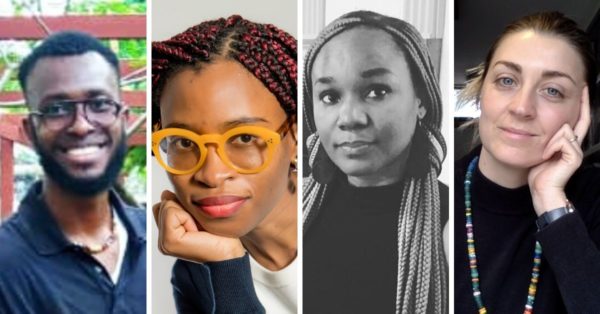
The 5 Shortlists for The 2019 Brittle Paper Awards were announced in November. Begun in 2017 to mark our seventh anniversary, the Awards aim to recognize the finest, original pieces of writing by Africans published online.
READ: The 2017 Brittle Paper Award for Creative Nonfiction & Memoir: Meet the Nominees
READ: The 2018 Brittle Paper Award for Creative Noniction: Meet the 8 Finalists
The $1,100 prize money is split across five categories: The Brittle Paper Award for Fiction ($200), The Brittle Paper Award for Poetry ($200), The Brittle Paper Award for Creative Nonfiction ($200), The Brittle Paper Award for Essays & Think Pieces ($200), and The Brittle Paper Anniversary Award ($300), for writing published on our site. The winners will be announced on or after Tuesday, 10 December 2019.
MEET THE 4 FINALISTS FOR THE 2019 BRITTLE PAPER AWARD FOR CREATIVE NONFICTION
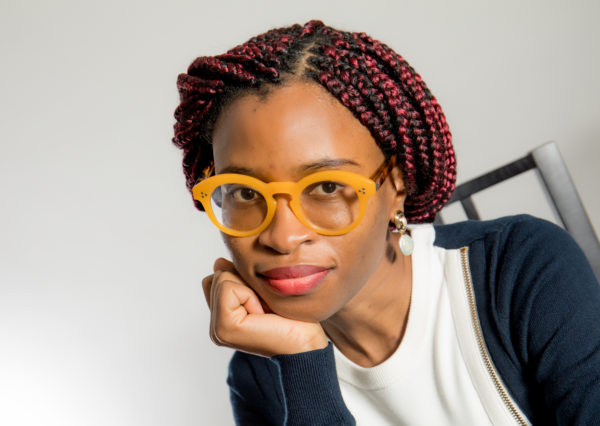
TOPE OWOLABI (Nigeria), for “The Smell of Oxford,” in The Book Banque
Tope Owolabi is a writer and editor living in London. She began writing in 2012, first on her blog and soon after as a weekly columnist for YNaija. In 2015, she attended the Farafina Creative Writing Workshop taught by Chimamanda Ngozi Adichie. In 2019, she won second place for the Mo Siewcharran Prize for Fiction for her manuscript Alien go Home and was longlisted for the Writivism Prize. Her fiction and essays explore loss and the delicateness of love.
A collector of books, she reviews released and forthcoming titles for publishers in London. She enjoys running. Her characters and dialogue are often fleshed out during running. In her spare time, she organizes reading clubs for children ages 3 to 6.
FROM “The Smell of Oxford”:
The smell of a city, with its hint of nostalgia, lingers in my nostrils like a spirit long after I have left. A distinct reminder of history and culture, one may call it, or of daily hustle or, simply, a peculiar habit. Ibadan, the city in which I was born and raised, smells of rust and burning refuse. Takoradi, where my father lived in the 60’s before I followed in his steps in 2013, arouses one with a heady smell of crayfish and palm oil. A smell like over-perfumed damp feet, conjures images of Dubai and Abuja for me. Two cities where I feel like something is always being covered up. In my hardest times, I find comfort in the once familiar, recollecting the smell and its memories, which inadvertently encourages me to visit again.
With Oxford, the city I am about to bid goodbye, I am unable to conduct this olfactory experiment. Unable to categorise the city into pungent or pleasant, treasured or woody. This, a year after the city greets me at the door with history and enchantment.
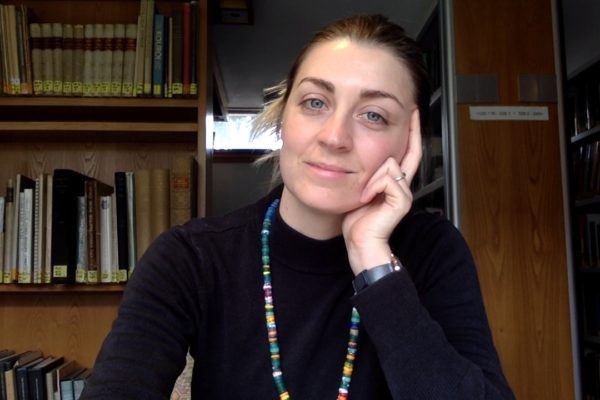
SIMONE HAYSOM (South Africa), for “Excellent Baddie Territory,” in Adda
Simone Haysom is a South African writer, currently living in Geneva. A recipient of a Miles Morland Foundation Scholarship, Haysom was a contributor to Safe House: Explorations in Creative Nonfiction. Between 2017 and 2019, she edited memoir, reportage, and essays for Prufrock. Her first book, The Last Words of Rowan du Preez’, was published in 2018 by Jonathan Ball Publishers and was described by Michela Wrong as “a true-crime story which not only captures the gritty reality of daily life in a South African township, [but] explores the shifting, teasing, ever-intangible nature of this thing called ‘truth’, posing the question of whether police procedure and a courtroom are equipped to establish it.” The Last Words was named by Quartz as one of the best African books of the year. In January 2019, she attended the Under the Volcano Workshop held in Tzepotzlan, Mexico.
Haysom’s writing has, most recently, been published in adda, Popula (“All in on the Red-hot Triple Ultra Stack Dragon,” and “Siya Kolisi’s Spell“), and The London Review of Books (“Mozambique’s Ghosts“).
FROM “Excellent Baddie Territory”:
These paradoxes are essential to Johannesburg’s nature, a city that never quite makes sense. And so it is impossible not to want to try and find something that unifies the sometimes-ugly, sometimes-beautiful, always-mismatched scenes you come across; not to want to try and find a way of reading the impress of all things on all other things.
For example, there are higher-than-average sightings of large objects on fire, particularly around the old city centre. This is not just because the winters are cold, and some people must stand outside in the freezing highveld air for their living; and these fire are also not, as is frequently the case in the other South African cities, centrepieces of protests. There is a more nonchalant, a more spontaneous attitude to fire in Johannesburg. Take this scene I was once saw on Marshall Street, for example: three people waiting for a bus, and one of them is a texting, and all of them are ignoring the double mattress to their left, extravagantly aflame.
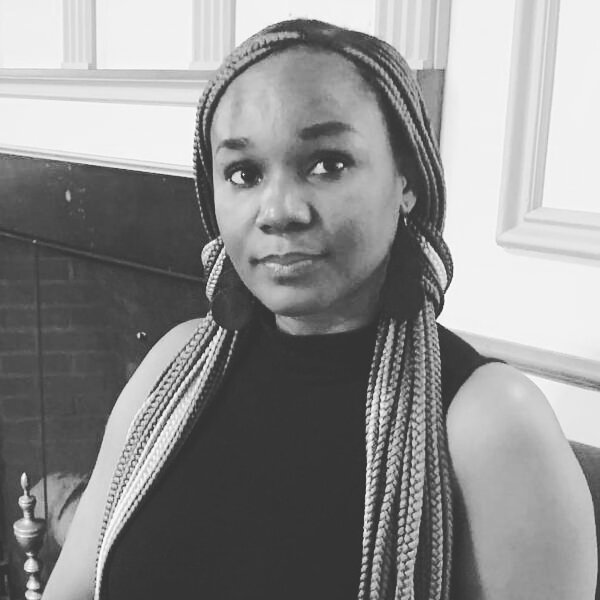
UKAMAKA OLISAKWE (Nigeria), for “After Three Children, Reclaiming My Body and My Mind” in Long Reads
Ukamaka Olisakwe grew up in Kano, Nigeria, and now lives in Vermont, USA. In 2014, she was named one of the continent’s most promising writers under the age of 40 by the UNESCO World Book Capital for the Africa39 project. In 2016, she was awarded an honorary fellowship in Writing from the International Writing Program at the University of Iowa. In 2018, she won the Vermont College of Fine Arts’ Emerging Writer Scholarship for the MFA in Writing and Publishing program.
Olisakwe, a finalist for the Miles Morland Writing Scholarship, has had her works appear in The New York Times, Long Reads, The Rumpus, Catapult, Rattle, Waxwing, Jalada, Brittle Paper, Hunger Moutain, Sampsonia Way, and more.
FROM “After Three Children, Reclaiming My Body and My Mind”:
While my body went to pieces after the birth of my first child, I still submitted myself to the process again and again. That is what I was taught marriage is all about — giving birth to children who will carry forward the man’s torch after you all are dead and gone, no matter the emotional and physical cost.
On our wedding day, families showered me with prayers: I would give birth to seven sons and two daughters, they would all gather again in exactly nine months to celebrate the arrival of our first child. I hefted those sacks of expectation on my frail shoulders like my mother had done and the mothers before us all.
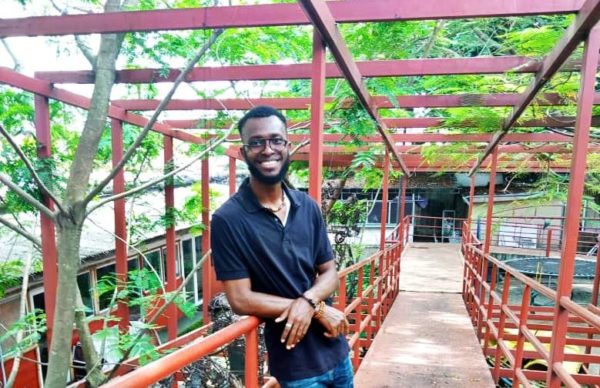
EBENEZER AGU (Nigeria), for “A Triangle of Time and Aging,” in Brittle Paper
Ebenezer Agu, poet, critic, essayist, & non-fiction writer, is from Nigeria. He is Editor-in-Chief of 20.35 Africa: An Anthology of Contemporary Poetry series and Poetry Editor at 14: Queer Art.
Agu also works in the field of creative economy as a culture, arts, and gender expert with the AU-EU Youth Cooperation Hub. In 2018, he attended the first summit of the Hub at the AU Headquarters in Addis Ababa. In 2019, he was invited to the Paris Peace Forum in the same capacity. He tweets @boyfriendTOadaa.
FROM “A Triangle of Time and Aging”:
To have observed the People’s Club complex, the Oasis of Hope home, and the old man at the door, all of which and whom have gone grey and sit unseen in the glare of people, is to have moved momentarily into the circumference of time, in which age is past, present, and future. It is to experience in my body the steady decline of man and the inanimate, what Cole calls “the inevitability of one’s radical diminishment.” This is the unfaithfulness of time to things that are living, even to the nonliving—to radically decline their preservation.
There would come a time when our muscles slacken, our skins creased, when we become grizzled, our passions dulled; these things happen to even objects. Living—reproduction, history, career, work, love, sex, religion, social interaction, activity—when compared to its own transformation in time is a process of forgetting. What is forgotten is not mortality but what happens at the circumference of time, before what has been living slips into nothingness. It is to be anesthetic of aging, to be conscious and yet unfeeling of what it means.
Enquiries, about the shortlisted writers or for interviews with them, can be sent to [email protected].


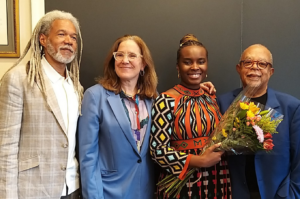






COMMENTS -
Reader Interactions